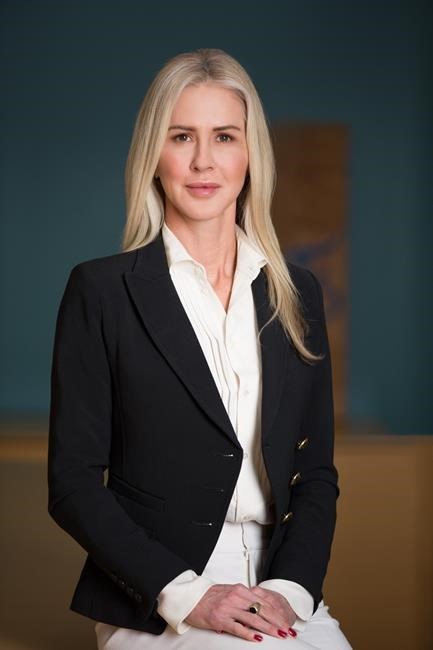CALGARY — Susannah Pierce's children aren't interested in following in her footsteps.
The president of Shell Canada Ltd., one of Canada's largest integrated oil companies, heads up a workforce of 3,500 Canadian employees, earned public recognition as the face of the $40 billion LNG Canada project, and has lived and worked around the world.
But Pierce's 15-year-old son and 13-year-old daughter don't see a future for themselves in the industry where their mother has thrived.
The oil and gas sector is simply "not as attractive as it once was" to today's young people, Pierce says bluntly, an uncomfortable fact she and other energy executives are being forced to face up to — even within their own households.
"If the conversation isn’t, 'I want to work in the same business as you, Mom and Dad,' then we have to ask ourselves why," Pierce said in an interview.
The dinnertime conversations between Pierce and her children are a scaled-down version of a wider discussion taking place in Alberta right now as an entire province tries to decide on its path forward.
While Alberta's historic oil and gas sector still makes an outsized contribution to the Canadian economy, it has been battered and bruised by seven years of low prices, pipeline protests and cancellations, layoffs, and consolidation. The province's unemployment rate is 8.5 per cent, and close to 30 per cent of downtown Calgary's office market sits vacant.
Alberta's long-term unemployment rate — the portion of the population that has been without work for more than a year — is 2.4 per cent, significantly higher than the national average of 1.4 per cent.
Even now, with crude prices higher than they've been in years, there is widespread acknowledgment that the energy landscape has permanently shifted.
Climate change and the transition away from fossil fuels have moved to the forefront of the national and international conversation. Investment dollars are increasingly flowing to industries with favourable environmental performance, and companies — Shell included — are investing in green technology and decarbonization as part of their own net-zero commitments.
In the past several years, there have been various government attempts to address Alberta's challenges, from tax credits aimed at boosting the province's rapidly growing tech sector to incentives for petrochemical development and investments in hydrogen technology.
Recently, a group of prominent Alberta CEOs — including Pierce — came together to form their own task force with the aim of coming up with long-term solutions for the Alberta economy.
“It’s a service in support of what governments might be able to do, without asking governments to do it for us,” Pierce said. "The world is changing, in terms of the energy product it needs. And as a result, we must change too."
The task force aims to come up with a series of economic strategies, policies and incentives that will attract investment and jobs to the province. It will also look at ways to keep young people in a province that is viewed by some as stuck in the past.
Also involved in the project, dubbed "Define the Decade," are other heavyweights like Enbridge's Al Monaco and Cenovus Energy's Alex Pourbaix. And the task force includes executives of some of the province's rapidly growing tech firms, such as artificial intelligence company AltaML and life sciences company DynaLIFE.
Diversification has been a buzzword in Alberta during previous commodity price downturns. It has always fallen by the wayside, though, when oil prices start to climb again, said Adam Legge, president of the Business Council of Alberta.
This time, however, it's different, he said, and there's no time to waste.
"Alberta's history of riding these boom and bust cycles ... is frankly, gone," Legge said. "But we believe our best days are ahead of us. So many of the things that are happening In the world, the trends, the evolutions that are happening — Alberta really has a shot to be a global leader.”
David Taras, a political analyst based at Calgary's Mount Royal University, said the idea of a group of Alberta's top CEOs joining together to lobby for diversification, green energy, and the startup economy would have been unfathomable 10 or even 5 years ago.
The public relations message has clearly shifted away from defending traditional oil and gas, he said, to establishing Alberta's role in the public eye as a future-forward investment destination.
“The global tide has shifted, and shifted dramatically," Taras said. "And the industry has not only caught up, but realized they have to move on, they have to be in a different place."
The Calgary and Edmonton Chambers of Commerce are not involved in the "Define the Decade" initiative but recently released a joint wish list for the federal election that calls for commitments from all the parties with respect to diversifying Alberta's economy.
Deborah Yedlin, president and chief executive of the Calgary Chamber of Commerce, said the organization is asking for everything from federal investments in grants and equity deals to foster the growth of the startup tech sector, to the creation of national Centres of Excellence within Alberta for sectors ranging from clean technology, artificial intelligence, and sports.
"We (Alberta) have the willingness to lead, but we can't do it on our own," Yedlin said. "We need federal support."
This report by The Canadian Press was first published August 29, 2021.
Companies in this story: (TSX:ENB, TSX:CVE)
Amanda Stephenson, The Canadian Press



